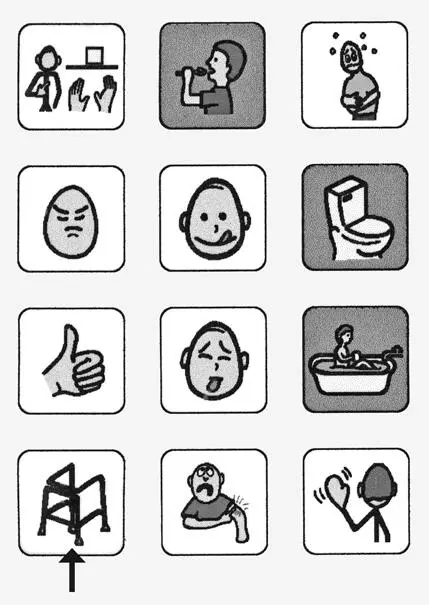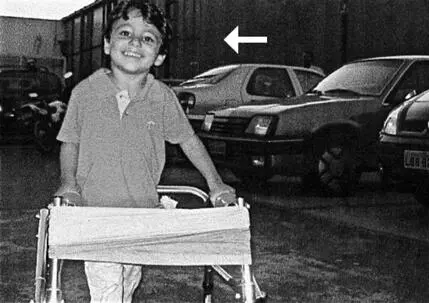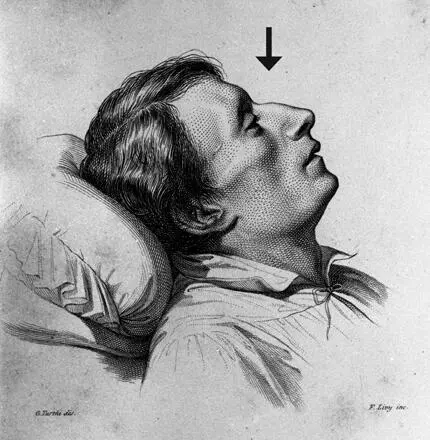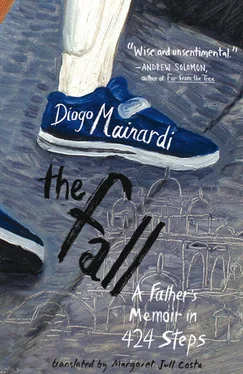237
Tito could communicate only through images, gestures, symbols, metaphors and analogies.
I had to interpret this. I had to adapt to his language. If he used images, I had to use images. If he used analogies, I had to use analogies.
That is how Tito became my God, my Law of Gravity, my Auschwitz survivor, my turtle, my water lily, my Lou Costello, my Richard III, my James Stewart, my Fall of the Bastille, my Jacopo Tintoretto, my Scuola Grande di San Marco.
238
Tito was the result of everything I had seen and read. In particular, he was the result of everything I loved.
239
At Christmas, in 2003, Tito was given a Kaye Walker.
240

241
In the previous image: the button Tito had to press on his communicator to ask for the walker.
242
Tito is now on his fourth Kaye Walker.
It’s exactly the same model as the first, only larger.
Of all Tito’s various modes of transport, the walker is the most valuable. He still uses it today to walk down the street. He will probably always have to use it.
243
Initially, Tito could take only one or two steps with the walker. He had to move in a straight line, because the wheels were locked in that position.
Around the middle of 2004, when Tito was getting better at controlling the walker, his therapist released the front wheels and I started walking with him in the underground garage of the building where we were living, in Avenida Vieira Souto, in Ipanema.
The garage was spacious and deserted. The floor was flat and smooth.
244
After exploring the garage, Tito became more confident and we set off to explore the garage of the building to the right. After exploring the garage of the building to the right, we went and explored the garage of the building to the left. Then, after exploring the garage of the building to the left, we explored the garages of dozens of other buildings in Avenida Vieira Souto.
245
Up until then, my sole talent had been my ability to leave Brazil; now, for the first time in my life, I was happy to be back in my native land.
The underground garages of Avenida Vieira Souto reconciled me to Brazil.
246

247
In the previous image: Tito in a garage with his walker.
248
Giacomo Leopardi was deformed.
He was four feet seven inches tall. Two large humps — caused by bone tuberculosis — made him a hunchback.
He was asthmatic and almost blind.
249
In one of his letters, Giacomo Leopardi said that his appearance was “wretched” and “utterly despicable.” He also said that he had “only half of what other men had.” He considered himself to be a “walking sepulchre” and expected death to come at any moment.
250
Just as I always wanted to leave Brazil, Giacomo Leopardi always wanted to leave Recanati, where he was born.
Recanati, according to him, was a “savage village,” inhabited by “vile, vulgar people.” He dreamed constantly of leaving “that filthy town, where the men were either asses or rogues — or both.”
Giacomo Leopardi dreamed of leaving Recanati and never going back.
251
In 1822, Giacomo Leopardi finally found a way of leaving Recanati. He spent some time in Rome, staying in the house of an uncle. Contrary to the idealized picture of the city he had built up from reading the Latin poets, Rome seemed to him squalid and provincial, corrupt and full of prostitutes.
Giacomo Leopardi returned to Recanati six months later.
252
When he returned to Recanati, Giacomo Leopardi devoted himself to a life that was “entirely and solely interior.” The fruit of that entirely and solely interior life were his Operette morali (Small Moral Works).
When I returned to Brazil, I too devoted myself to a life that was entirely and solely interior. My Operette morali were the underground garages in Avenida Vieira Souto. Tito and I would spend the day there, exploring their interior.
In his speculative garage, Giacomo Leopardi conversed with Torquato Tasso and with the Moon. Tito and I conversed with the porters of the buildings of Ipanema and with Toyota SUVs.
253
In Recanati, between 14 and 19 May 1824, Giacomo Leopardi wrote his “Dialogue between a Natural Philosopher and a Metaphysician,” the tenth essay in his Operette morali .
The Natural Philosopher, inspired by the medical quackery of Tommaso Rangone, the author of How Man Can Live for More than 120 Years , reveals that he has discovered — “Eureka! Eureka!” — how to become immortal.
The Metaphysician replies that he is only interested in “the art of living little, because if life is unhappy — and it always is — the shorter the better.”
254
Giacomo Leopardi’s life was short.
He died when he was thirty-eight, after eating, in one night, a kilo and a half of cinnamon sweets from Sulmona.
To go back to Tommaso Rangone: the food that proved to be most harmful to Giacomo Leopardi’s health were those cannellino di Sulmona .
255

(Picture Credit 1.14)
256
In the previous image: Giacomo Leopardi dead.
257
For Giacomo Leopardi, unhappiness was man’s natural state.
In “Dialogue Between a Natural Philosopher and a Metaphysician,” he argues that “life and unhappiness can never be separated.”
In “Dialogue Between Torquato Tasso and his Spirit,” the Spirit sums up Giacomo Leopardi’s Theory of Pleasure, explaining to Torquato Tasso that, since “the desire for pleasure is infinite, no real pleasure — which is, inevitably, finite — can ever satisfy that desire.”
In “Dialogue Between Malambruno and Farfarello,” Malambruno expresses the desire “to be happy at least for a moment.” When the diabolical Farfarello tells him that this is impossible, Malambruno concludes that the only happiness available to man is death, because only someone who ceases to exist ceases to be unhappy.
258
Giacomo Leopardi, who was known in Recanati as “the hunchback of Montemorello,” used disability and deformity as a metaphor for his “cosmic pessimism.”
He wrote:
What is life? The journey of a sick and crippled man who carries the heaviest of burdens on his back and walks day and night, never resting, up and down steep mountains, through snow and ice, through rain and wind, and in the burning sun, until he reaches the edge of a precipice or a ditch and falls inevitably into it .
259
What was my life like in Rio de Janeiro?
It was the journey of a boy with cerebral palsy, who, with his walker, went up the ramps of the underground garages in Avenida Vieira Souto, which reeked of petrol and exhaust fumes, until he reached the edge of a step and managed to stop before he fell.
260
Happiness is Tito’s natural state.
He infected me with his cosmic optimism. Devoting myself “entirely and solely” to him, I too was happy.
Читать дальше















